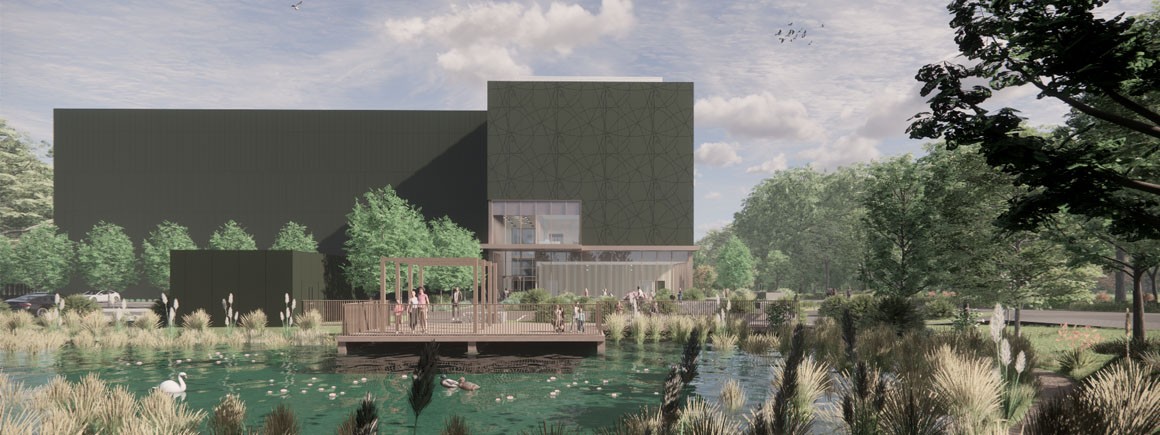- Content
- News
- Plans Approved for New Natural History Museum Site
20 March 2024
Wokingham Borough Council has approved plans for a new 25,000m² flagship site to house Natural History Museum collections.
A purpose-built facility at Thames Valley Science Park will eventually house 28 million specimens – the largest ever move of natural history specimens globally. This includes mammals, non-insect invertebrates (such as corals, crustaceans, molluscs and worms), fossils and molecular collections.
The site will include an imaging and analysis centre, including digitisation suites, molecular biology laboratories, including ancient DNA labs, cryo-facilities for tissue storage, conservation labs; and specimen preparation labs, including quarantine facilities.
All-Electric New Natural History Museum Building
Architects Feilden Clegg Bradley Studios are leading a consultant team including Ramboll, Grant Associates and Mace. Targeting a net-zero carbon building in construction and operation, the site’s energy strategy relies on the adoption of renewable sources of energy to offset the electricity demand of the building, including air-source heat pumps and solar PV panels.
The project aspires to deliver a Biodiversity Net Gain of 20 per cent, however this will extend beyond the site boundary, with additional habitat creation and restoration within the River Loddon corridor.
Simon Carter, Partner at Feilden Clegg Bradley Studios said: “The Natural History Museum’s collection is huge, diverse and of incredible value to the scientific community. In making a purpose-built facility for storage and conservation, in a world class working environment, we are realising the potential to make this collection an international resource for learning about climate change and how we can help the natural world as we go through this period of immense planetary change.
“The building itself is designed for the future, with longevity, durability and resilience underpinning the design. It is low energy, using the fabric to produce a stable environment reducing the underlying energy use. The materials are designed for the circular economy, providing benefits beyond the life of the building. Its setting – in parkland of native tree and shrubs, and wildflower rich grasslands – will increase the habitat available for wildlife, as well as being a space for staff to take breaks.”
The project is being funded by a £201 million government grant and is planned to be operational by 2031.
Picture: a CGI showing the proposed front of the facility, showing a view across a natural pond. Image Credit Feilden Clegg Bradley Studios architects, courtesy of Natural History Museum
Article written by Ella Tansley | Published 20 March 2024
Share
Related Articles
British Land and Royal London Form Joint Venture to Operate 1 Triton Square
British Land has sold 50 per cent of its stake in 1 Triton Square at Regents Place to Royal London Asset Management Property.
The companies have formed a joint...
Read Full Article
Museums in England to Benefit from New Infrastructure Funding
The latest round of the government’s Museum Estate and Development Fund means that museums across England can apply for a share of £23.8 million for...
Read Full Article
Government Property Agency Plans for New Weather Centre HQ
A planning application for a new European Centre for Medium-Range Weather Forecasts has been submitted by The Government Property Agency.
The new building at the...
Read Full Article
Canary Wharf Shareholders Invest £400m for ‘Strategic Repositioning’ Plans
Brookfield and the Qatar Investment Authority, which own Canary Wharf Group, have committed to invest £400 million to help complete “the strategic...
Read Full Article
High Performing Buildings – July’s Roundup
ThisWeekinFM’s high-performing buildings roundup includes new plans for the Square Mile’s third tallest tower, a new life sciences building at Canary Wharf...
Read Full Article
British Land Reveals Euston Tower Plans to Become Life Sciences Hub
British Land has unveiled plans to transform London’s Euston Tower into a life sciences and innovation hub.
The building is set to become a modern, net-zero...
Read Full Article
Museum of London Relocation Project Awarded £73m Funding
The next phase in the relocation and regeneration of the Museum of London has been awarded £73 million of funding from The City of London Corporation.
The new...
Read Full Article
CO2-Absorbing Paint Graphenstone Launches New Colours With Ashmolean Museum
The eco-paint brand Graphenstone has joined forces with the University of Oxford’s Museum of art and archaeology, The Ashmolean, to launch 16 new colours.
The...
Read Full Article
Apleona Wins Hard FM Contract for Jewish Museum in Berlin
Apleona has been commissioned by the Jewish Museum Berlin Foundation to provide hard services for the Jewish Museum Berlin.
With around 700,000 visitors every...
Read Full Article
Birmingham to Benefit from New Health Innovation Campus
Birmingham is set to lead the delivery of medical innovation in the Midlands through the development of Birmingham Health Innovation Campus – attracting significant...
Read Full Article



.png)
.gif)


.gif)
.gif)


.png)


.png)

.png)

.jpg)



.jpg)

